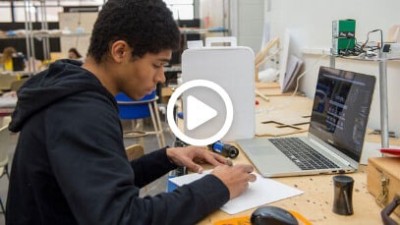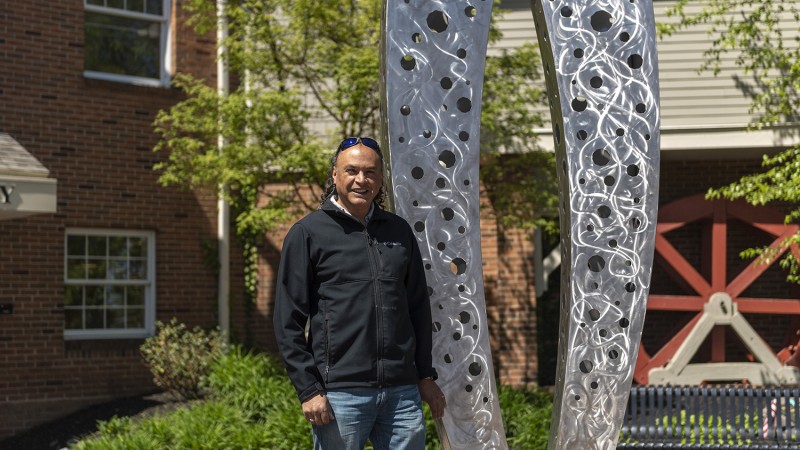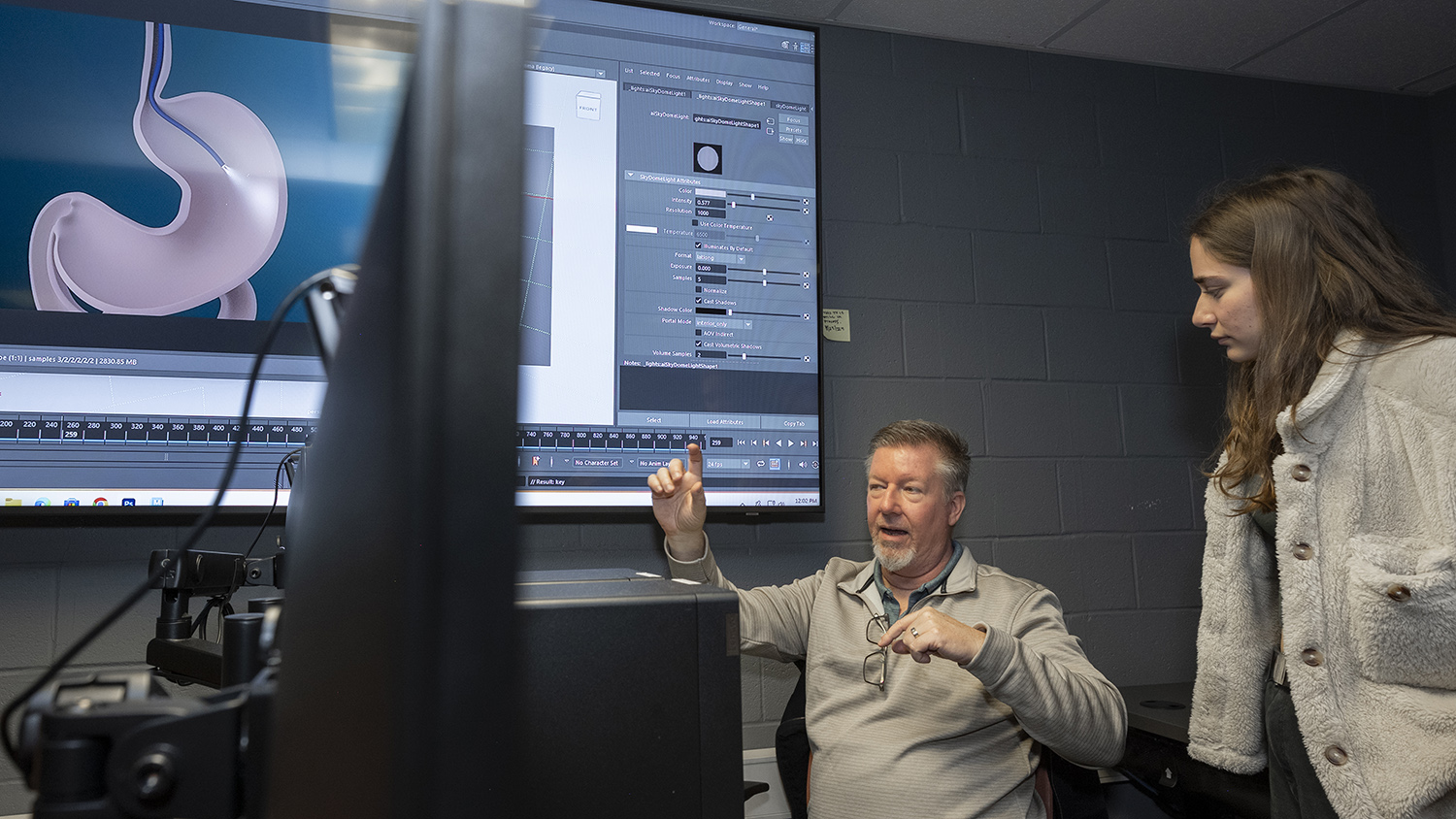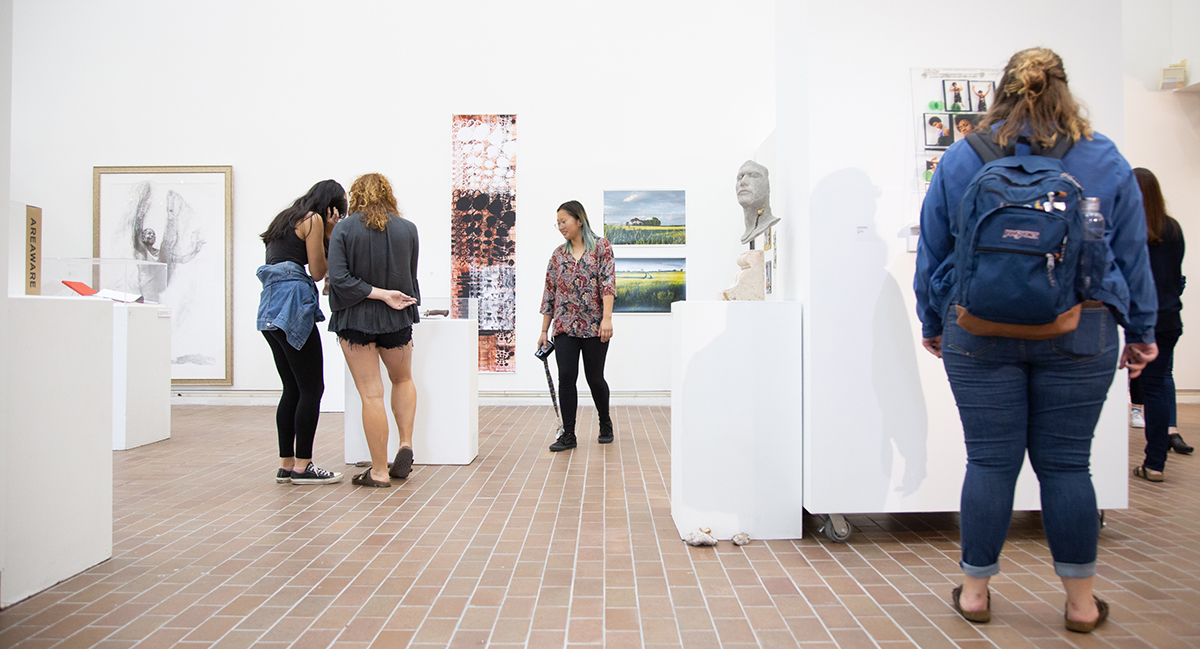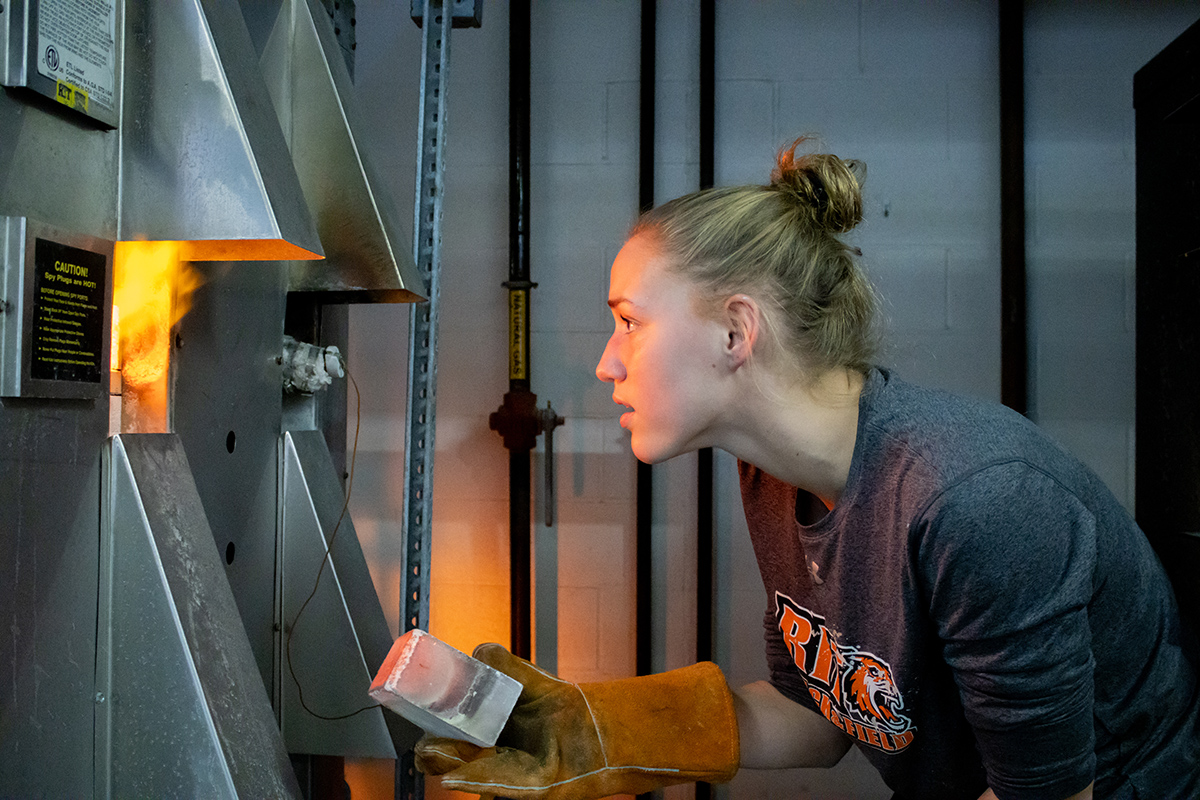School of Art

School of
Art
- RIT/
- College of Art and Design/
- Academics/
- Schools/
- School of Art
Overview
From an idea to a concept to the finished piece, the School of Art is made up of a tight-knit community of makers who ideate and create one-of-a-kind art. Whether it’s using 3D printers, charcoal and a sketch pad, or a pottery wheel, students use cutting-edge technology and traditional methods to produce stunning work that culminates with a gallery exhibition in their senior year. The school is led by award-winning faculty members who exhibit in galleries and juried shows around the world. The breadth and depth of the facilities and studios are unmatched by our peers. Graduates have a solid foundation for a career as a professional artist — producing, marketing, and selling their work or other opportunities such as teaching, advertising/marketing, or arts administration.
Pre-College Portfolio Preparation Workshop
The School of Art's annual Pre-College Portfolio Preparation Workshop is a two-week visual arts class designed to prepare the portfolios of rising high school juniors and seniors for admission to college art programs.
16
A maximum class size of 16 ensures students receive individualized attention.
15
The School of Art routinely welcomes more than 15 visiting artists each year for in-person or virtual demos and lectures.
100%
Every student studying an option in the studio arts program exhibits their work at least once in an RIT gallery spaces.
Latest News
-
December 16, 2025

RIT alumni network sparks high-end design collaboration
A chance interaction between old classmates led to a rewarding design collaboration for the alumni-run furniture design studio Edgewood Made (George Dubinsky '11 and David Short '13) and Gunther Jacobson '12. Edgewood Made designed millwork and kitchen cabinetry for a luxury home that they then trusted Jacobson to install in the Miami area home.
-
November 12, 2025

RIT student brings the action of ‘Predator: Badlands’ to the streets of Los Angeles
Lucy Ray, a fourth-year medical illustration and psychology dual-degree student, spent her summer working as a contracted artist for Drissi Advertising, working on ads for movies like Predator: Badlands.
-
September 24, 2025

New School of Film and Animation director, faculty roles for 2025-26
Ricky Figueora taking over as the new director of RIT's School of Film and Animation headlines exciting promotions and additions to the College of Art and Design faculty.
Featured Work and Profiles
-
Game Illustrator
Julie Toich '22 (Illustration) has created illustrations for multiple video games as part of multidisciplinary teams of RIT students.
Read More about Game Illustrator -
Profile: Ashley Mastin '21
Ashley Mastin parlayed her experience in RIT's Medical Illustration program into becoming a scientific illustrator for Science magazine.
Read More about Profile: Ashley Mastin '21 -
Building a Pipe Organ
A skilled designer and musician, Kelly Cleveland '21 (Furniture Design) constructed an awe-inspiring handmade pipe organ for his capstone project.
Read More about Building a Pipe Organ -
Public Sculpture
Juan Carlos Caballero-Perez, professor of Metals and Jewelry Design, created a near-12-foot sculpture for the Village of Fairport, N.Y.’s Kennelly Park, outside the public library. It was the...
Read More about Public Sculpture -
Editorial Illustrator
Doug Chayka Renowned freelance illustration Doug Chayka '96 has a client list that includes The Atlantic, Boston Globe, New York Times, New Yorker, Washington Post and many other publications.
Read More about Editorial Illustrator -
Marvel-ous Artist
Adam Kubert Adam Kubert '81 (medical illustration) has used his super drawing talent to make a successful career as a comic artist, working for DC Comics and now exclusively Marvel Comics.
Read More about Marvel-ous Artist
Undergraduate Programs
The School of Art offers professionally oriented degree programs in studio arts (options in ceramics, expanded forms, furniture design, glass, metals and jewelry design, non-toxic printmaking, painting, and sculpture), illustration, and medical illustration. The studio arts degree is studio intensive and allows you to immerse yourself in a concentration, developing both technical and creative skills. The highly sought-after medical illustration BFA is one of only a few offered in the country. Medical illustrators transform complex information into visual images that communicate with a variety of audiences from patients to doctors to scientists. Graduates of the illustration program work for publishing companies, advertising firms, and corporate art departments, as well as create and design concept area for cinema, games, and animation.
RIT's ceramics BFA covers a range of fundamental topics within ceramics including sculpture, pottery, mold-making, glazing, firing, and material science.
Learn more about the Ceramics Option - Studio Arts BFA programIn RIT’s furniture design degree, you will gain a comprehensive technical background in contemporary woodworking rooted in craftsmanship, creative design, and art-making.
Learn more about the Furniture Design Option - Studio Arts BFA programExpand your interest with a glassblowing degree emphasizing research, idea development, and material exploration to ensure professional success.
Learn more about the Glass Option - Studio Arts BFA programRIT’s illustration BFA degree combines traditional drawing, digital imaging technology, and sculpted dimensional methods for effective visual communication.
Learn more about the Illustration BFA programRIT’s medical illustration BFA teaches you to take complex scientific and medical information and distill it into stunning visual images.
Learn more about the Medical Illustration BFA programRIT’s metals and jewelry design degree focuses on a variety of design principles, aesthetics, as well as material and process mastery.
Learn more about the Metals and Jewelry Design Option - Studio Arts BFA programRIT's BFA in painting covers traditional methodologies as well as contemporary visual art practices through creative and engaging studio practice and critical discourse.
Learn more about the Painting Option - Studio Arts BFA programRIT's BFA in printmaking curriculum addresses a variety of media, tools, and both traditional and technological techniques related to printmaking concepts, as well as theory.
Learn more about the Printmaking Option - Studio Arts BFA programRIT’s dynamic BFA in sculpture and expanded forms degree explores three-dimensional art-making, ranging from traditional materials and techniques to new technologies.
Learn more about the Sculpture and Expanded Forms Option - Studio Arts BFA programExplore ceramics, sculpture, glass, metals, painting, and more while mastering conceptual and technical art skills.
Learn more about the Studio Arts BFA programSpend up to a year exploring RIT’s studio art options.
Learn more about the Studio Arts Exploration programGraduate Programs
The fine arts studio MFA is a two-year program made up of immersive studio courses chosen from painting, sculpture, printmaking, and expanded forms. The program culminates with a thesis and an exhibit in the college’s Bevier Gallery. The Master of Science for Teachers in visual arts-all grades (art education) program prepares students to become certified to teach kindergarten up through 12th grade in New York state.
This master’s in fine arts explores the role of contemporary art through painting, printmaking, sculpture, and expanded forms.
Learn more about the Fine Arts Studio MFA programAn art education master's degree that sharpens your artistic abilities as you prepare to teach the next generation of artists and creators.
Learn more about the Visual Arts–All Grades (Art Education) MST programMinors and Immersions
The 2D studio arts minor allows students to develop and refine the practices inherent in the production of two-dimensional fine art forms, including drawing, painting, printmaking, and photography. Students develop conceptual, analytical, and technical skills in these media while learning to connect inspiration and ideation to creative visual expression in two dimensions. Once the two required introductory courses are completed, students may use elective courses to explore diverse two-dimensional media, such as painting, printmaking, and photography, or they may choose to work more intensively within one medium.
Learn more about the 2D Studio Arts Minor programIn the 3D studio arts minor students develop and refine the practices required for the production of three-dimensional art in various media. Students develop conceptual, spatial, analytical, and technical skills while working through the process of art making from ideation to the production of creative visual expression in three dimensions.
Learn more about the 3D Studio Arts Minor programExplore the history of art and architecture across multiple cultures and eras. Art historians examine a culture’s artistic production, analyzing form, content, and creative context to better understand how art expresses the intent of the artist, the interpretation of the viewer, or particular cultural values and ideals. Students will use art historical methodologies to evaluate works of art, formulate a history of artistic style, analyze art in relation to its historical context, and engage with the world of contemporary art.
Learn more about the Art History Immersion programExplore the history of art, architecture, craft, design, photography, and aesthetic theory across multiple cultures, eras, and intellectual perspectives. Art historians examine a society’s artistic production, analyzing form, content, and process to better understand how art expresses meaning within specific cultural contexts. Students completing this minor will be able to use art historical and related methodologies to evaluate works of art, formulate a history of artistic styles, analyze art in relation to its historical setting, and engage with the world of contemporary art. The minor's emphasis on writing and critical thinking complements any academic program while the inclusion of visual analysis, historical context, and theoretical approaches to artistic production make this a useful addition for students seeking careers in areas such as the fine arts, education, design, communication, game design, museum and gallery work, or digital humanities.
Learn more about the Art History Minor programStudents will develop knowledge of specific media, including wood, metal, ceramics, glass, and textiles. They also will study the material properties of these media and hone technical skills while expanding and applying critical thinking skills as they work through design process from ideation to fabrication. Students will also learn about expected working practices within collaborative studio spaces and within the discipline more broadly.
Learn more about the Craft and Material Studies Minor programThe glass minor provides students with an opportunity to diversify their voice and vision through an extensive experience in all glass working processes supported by the glass studios in the College of Art and Design. Aside from developing a breadth of technical understanding in working with glass, the minor culminates in a portfolio of work demonstrating a diversified approach to glass making and glass thinking. Completing the glass minor will further amplify students' creative potential and supplement each student’s overall education at RIT.
Learn more about the Glass Minor programThe metals and jewelry design minor gives you an opportunity to immerse yourself in a creative environment of problem solving and to develop traditional and contemporary metals and jewelry design skills. Through a personal investigation of traditional metal techniques and material processes for the fabrication of small objects and jewelry, you will develop a personal design aesthetic and vocabulary. This will be demonstrated through the creation of a portfolio of work.
Learn more about the Metals and Jewelry Design Minor programThis minor engages students in the interdisciplinary study of the book as a concept central to human experience. The book—broadly defined as a unit of textual information that may take material or digital form—is a record of cultural production. Students pursuing this minor have the opportunity to examine books and book forms as makers, consumers, and researchers. The book minor allows students to explore intersections between art, design, technology, and science through the idea of the book, connecting creative expression, entertainment, and the production of knowledge.
Learn more about the The Book Minor programStudent Resources
For internal College of Art and Design resources such as academic information, forms, FAQs and more, visit myRIT. For information about academic advising, visit here.



